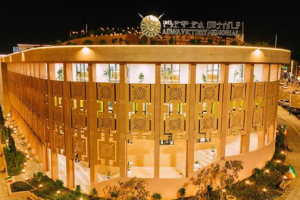
BY MULUGETA GUDETA
It was amazing on my part to watch a recent television advertisement featuring mouth-wetting fasting dishes at a restaurant in the posh Bole area of the capital Addis Ababa. The fasting dishes were colorful displays of vegetables and fish that were priced a whopping 1200 Ethiopian birr. All those less fortunate people who are getting daily punches in their stomachs from rising food prices should have seen this particular advertisement, at least to see how misery and plenty coexist in a world of growing income inequalities.
The food advertised on TV must be the most expensive single meal that has never been offered for sale in the media as far as my experience is concerned. It must also be a record price. The question that came to my mind in relation to this was: what will be the price of meaty dishes after Easter given the too obvious fact that Ethiopians are famed for their love of meat that sometimes verges on obsession? By the way, meat lovers who went to the cattle market on the eve of the Easter holiday looked disappointed according to report by other TV channels that showed them complaining about the skyrocketing prices ranging into tens of thousands of dollars for a single fattened bull. The animal looked fantastic on television despite the mournful appearances of potential buyers.
The other question I asked the guy who was sitting next to me in an ordinary eatery and watched the TV advertisement with equal shock was: are there many people out there who spend so much money on a single fasting meal? He smiled sarcastically and told me that there are places in our capital where ordinary people would not dare venture even if they hit the jackpot. He reminded me the simple economic truth that there is no supply without demand. He was right. No restaurant owner in his right mind would produce offer to his customers such an admirable traditional dish in order to display it to hungry window-shoppers.
A week or so before Easter, I had the feeling that I should visit the vegetable market in my neighborhood to see how people were trying to deal with the prices of basic ingredients or the inputs make the holiday meals taste great and earn housewives appreciation. The market was so crowded that there was no place for someone like me interested more in the spending behavior of consumers in this difficult time of rising inflation largely caused by supply side shortages. Buyers were busy paying the requested prices without much ado although their dissatisfaction could be seen printed on their faces. They were not what we call over-spenders but rather under-spenders.
I also asked other consumers who visited other markets in various parts of the capital. These were rather normal spenders in abnormal times. But this state of market normality or abnormality is usually transient and irregular because the same food item costs high in some markets while they cost less in others. Thmay be what American economist Joseph Stiglitz called, “information asymmetry” that is sometimes leading to price distortions.
Speaking of money or overspending, we have heard many times about big and legendary spenders who famously or infamously spend millions on a single item like the famous American boxer Mike Tyson who used to pay a couple of millions of dollars for a diamond ring and many times more for luxury cars. Big spenders and big liars seem to have similar destinies. They both end up broke, the former by finishing his money on consumer items and gifts that do not make sense and the latter psychologically because no one would believe them even if they speak the truth now and then.
Mike Tyson’s fortune reached $ 400 million at the peak of his success when he made $30 million on average at each of the match that finished within minutes with knock outs. The spending spree followed and he threw millions left and right until prison and drag addiction made a stop to his indulgences. What followed was a sad history of trips to and out of jail, addiction, anger and crises of one kind or another resulting in his loss of both boxing talent and his easily acquired fortune.
There are also lesser known money spenders whose fate is similar to the one Tyson faced earlier in his life. There are also people who spend a lot of money on drinks and foods and throwing parties almost every day and buying things they do not have use of or gifts that they give to undeserving people. On the other hand there are what we may call the charitable spenders who share their fortunes with the less fortunate members of society or donate a part of it to good causes. Bill Gates may be one of them at the highest level of the wealth echelon.
There are also lesser known mortals who share what they have or what they collect from the rich to give it to the “wretched of the earth” and get immense satisfaction by doing so. One local example may be a young man called Biniam, the philanthropist and founder of the biggest shelter or home for the elderly and the poor whom he picked from the streets and brought them to his home where they get food, shelter and medical attention.
In a recent interview with a television channel Biniam was reported as saying that he gets extreme satisfaction with what he is doing for society while he prefers to remain poor than be rich and famous. This is of course a behavior almost worthy of saints. Poverty may not be a virtue but in this case it may be the expression of ultimate generosity and money well-spent. Biniam “begs” money from society to give it to the poor, the weak and the forgotten and continue to live in modesty.
People who spend fortunes on weddings, parties, banquets and dawn to dusk food consumption may be a category in themselves. Their number may be small but their deeds are great. They are acting like the Great Gatsby, the leading character in the novel by Scott Fitzgerald, the great American writer. Someone was telling me the other day that our compatriots often referred to as “Diaspora” are great spenders on these kinds of conspicuous consumption. Assisted by the purchasing power of the dollar, some of them are said to be spending tens of thousands in local currency feasting on food, drinks and pretty girls, gifts and what not.
There are also among them who donate money to worthy causes and to less fortunate compatriots, buy cars and houses to their parents or give out money to philanthropic causes. They have all the rights to do so and nobody has the right to criticize them as long as what they spend is their own money. They are mentioned here simply to illustrate a case of too much spending money something that could be used sparely.
Overspending in Ethiopian urban societies is usually most pronounced during the month of Tir (January) and Miazia (the second half of April). These are months of weddings and other religious celebrations. After Easter, many families in the Capital Addis Ababa and outside are going to experience another rise in their spending sprees. Weddings in Ethiopia cost much to the families of the brides and the grooms although nowadays educated young Ethiopian tend to cover the costs themselves. Their weddings are less costly and they think more about the post-wedding challenges rather than the day when they tie the knot.
In the older days, parents were willing to cover the costs of weddings for their sons or daughters. Life was relatively cheaper and tradition was still alive. Parents get big pride in doing so because they enjoyed seeing their offspring start a new life. Nowadays life is very demanding for newlyweds in particular, for obvious reasons. In former times Easter feasting went on and on for more than a week even after “dagmaytensai” (the second Easter) was long past. People were eating and drinking as villagers prepare the meals by turns and invite one another for lunch or dinner.
Nowadays, many who live from hand to mouth and those who spend everything in a single day as if there is no tomorrow must be licking their wounds once the holidays are over and become a distant memory. The problem is that we have less time to mourn the consequences of our recklessness because most of us are forced to get out of bed the next day to think about where the next meal will come from. In the hope that things will improve before next Easter holiday. Abroad there is a tendency of displaying Holiday-spending supported by researches
THE ETHIOPIAN HERALD WEDNESDAY 19 APRIL 2023





